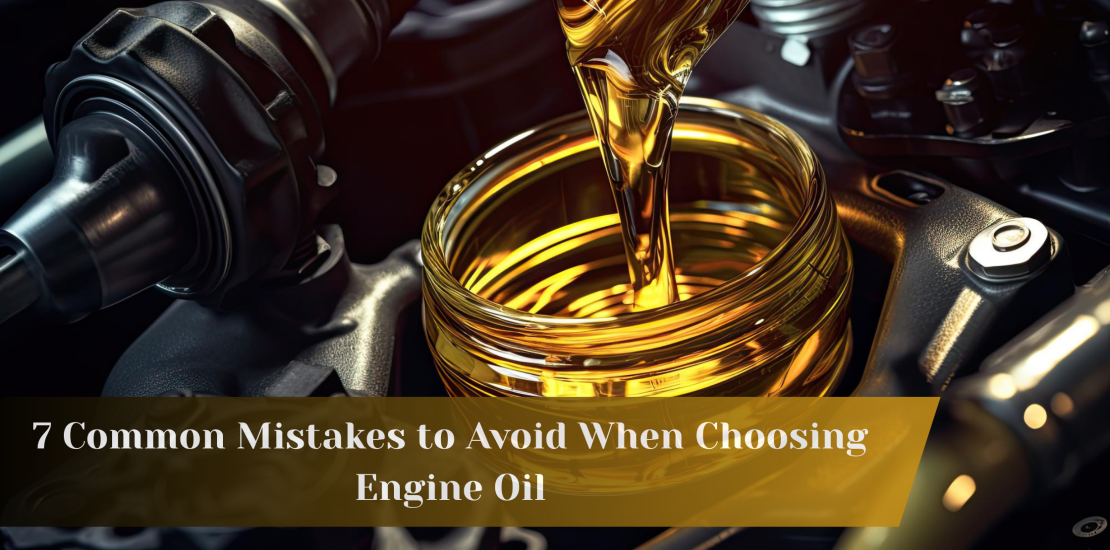7 Common Mistakes to Avoid When Choosing Engine Oil
- October 22, 2025
- Posted by: General Petroleum
- Category: Blogs

Selecting the appropriate engine oil may look straightforward, but it’s one of the most critical choices you’ll make for your car’s health and performance. Whether you’re going to Buy engine oil in Dubai or seeking advice on international products such as the best engine oil in USA, knowing what is involved in selecting the right oil can prevent you from spending money on repairs and low performance. Most vehicle owners don’t think of engine oil as much more than a checkup item. But it is essential to your vehicle in terms of efficiency, longevity, and the reliability of your engine. Spending money on the wrong oil can cause you engine overheating and loss of mileage and potentially permanent damage that will be expensive and in some instances impossible to repair in your engine compartment. Education can help you avoid potential issues.
Upon exploration into topics that focus on Why Racing Engines Require Specialized Oils, for example, you will learn that engine oil is not a universal product. Similar to high-performance engines that demand specially formulated oil to cope with extremely high heat and high-pressure applications, your car requires oil with specifications that align with its own. Different driving conditions, types of engine, and climates require oil with a variety of viscosity grades and additive blends. Even in the heat of the UAE climate, the proper oil viscosity can be the difference between optimal operation or early wear of the engine.
The same goes for the debate of Grease vs. Oil in UAE: Choosing the Right Lubricant for Your Machinery. There is one fundamental point brought out through the discussion — not all lubricants are created equal. Grease remains longer in position due to its capability of protecting equipment running at slower speeds, while engine oils will always protect and transfer heat at higher engine speeds. With these distinctions in mind – as well as with secondary dispersant additives that can activate at higher temperatures – you will be well informed to select the best lubricant for your equipment or vehicle.
Now let’s switch gears and talk about our 7 common engine oil selection mistakes and how to avoid them.
Disregarding Manufacturer Recommendations
Every vehicle has a specified oil listed in the owner’s manual or another piece of information for that vehicle. One of the most frequent and costly mistakes is starting to use an oil without checking that information. The viscosity grades (5W-30 or 10W-40) are based on specifications and design by various OEM’s for the engines they create. The viscosity grades are not just random values, so ignoring the values when choosing an oil can cause adverse effects on engine lubrication, fuel efficiency, and/or warranty requirement. It is always best to use the manufacturer’s specifications for best results and life.
Selecting the Wrong Viscosity
Viscosity dictates an oil’s flow with temperature, and in hot environments such as Dubai and Abu Dhabi, low viscosity oil can break down too quickly, losing that protection. Low-viscosity oil in cold temperatures can become too dense and would not lubricate sufficiently. When purchasing engine oil in Dubai, go for a product that remains stable under high heat while flow remains smooth for start-up protection.
Ignorance of Synthetic vs. Conventional Oil Differences
Most drivers still opt for regular oil for cost savings, but this is a short-term consideration. Synthetic oils, including the finest engine oil available in the US, offer enhanced protection, improved thermal stability, and longer oil change intervals than standard oils. They are particularly advantageous for high-performance, turbocharged engines. While they are slightly more expensive initially, they lessen engine wear and lengthen the life of any engine, making them a better overall investment in the long run.
Disregard for Driving Habits and Conditions
Your driving conditions and driving habits significantly impact your oil choice. For instance, combining shorter trips, excessive stop-and-go city driving, and either extreme cold or extreme heat rate a heavier stronger oil chemistry. If you tend to drive “hard” or “heavy” you might consider using oils, the same types talked about in Why Racing Engines Need Specialized Oils, that resist mechanical stress and resist thermal degradation better.
Ignoring Oil Additives and Quality Standards
The engine oils are formulated with additives such as detergents, dispersants and anti-wear agents. API (American Petroleum Institute) or ACEA (European Automobile Manufacturers Association) certification, is assurance of protection and overall performance. Use of non-approved or cheap oils can cause sludge or unwanted deposits, not to mention ultimately reducing protection and increasing overall maintenance costs.
Not Checking Oil Compatibility with Older Engines
Sometimes, engines can require a different type of lubricant. If an engine has a certain number of miles on it, it has already experienced wear, leaky parts, or may have had or will have low lubrication pressures if modern low viscosity oil is being used. Best to discuss with a trustworthy mechanic and consider oil that states “high mileage” on the bottle when switching oil in an older vehicle. All high mileage oils have a conditioner or other additive that helps rejuvenate seals and reduces oil loss.
Skipping Regular Oil Changes
Regardless of the kind of oil, if it isn’t changed on a regular basis the oil will not perform as it was designed to perform. Oil is a liquid which will eventually break down and thin out from usage and has dirt, metal shavings, and carbon deposits fill the oil. Oil changes are really needed to maintain the cleanliness of the engine and to prevent sludge from building up. Typically the average person is likely to suggest an oil change every five-thousand to ten-thousand kilometers depending on oil type and driving conditions.
Bonus Tip: Reading Oil Labels
When you look at an oil bottle, do not just pay attention to the brand — but notice the numbers and certifications. For example, a 5W-40 oil informs you of the temperature viscosity range for cold/warm temperatures. Descriptions such as “Fully Synthetic” or “High Mileage” also inform you if the oil can be used in your car.
Final Thoughts
Selecting the proper engine oil involves more than selecting a manufacturer; it involves identifying the precise needs of your car. Whether you are about to purchase engine oil in Dubai, taking notes from the Top engine oil in USA, or learning from Grease vs. Oil in UAE: Choosing the Right Lubricant for Your Machinery, information is your biggest resource. By utilizing a high-quality oil you will enhance engine performance, minimize fuel consumption, assure a long life of parts, and smooth driving.
By avoiding these mistakes, you will protect your engine, while also protect the efficiency and consistency of performance into the future. In a world that runs on accuracy and reliability, the best engine oil for your car is your greatest safeguard, and your best tactical confrontation.

